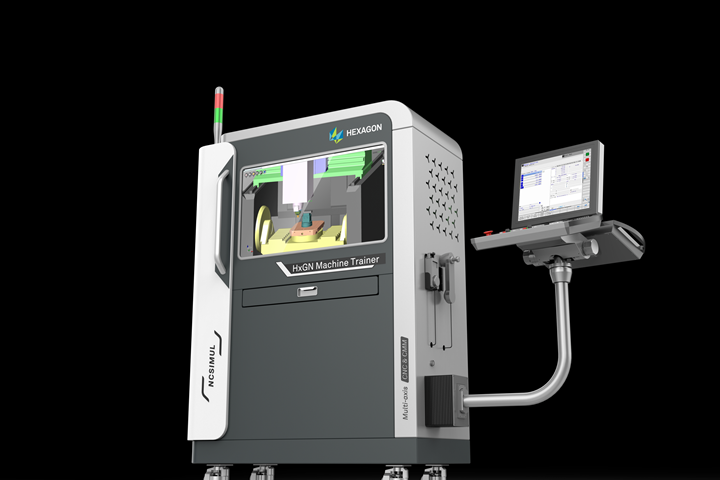Can Machining Simulation Propel Machining Education?
Digital twins prove their worth for not only proving out CNC programs, but also training the next generation of programmers.
Why shouldn’t machinists train like pilots – with a simulator that eliminates real-world risk to people, machines and parts?
This is precisely the idea behind the Hexagon Machine Trainer (HMT) from Hexagon Manufacturing Intelligence. The computerized HMT kiosk offers an ideal showcase for how the same technologies that drive production can also be employed for other, seemingly unrelated ends – in this case, education.
Complete with attached CNC panel, hand wheel, tower indicator and even coolant animation and machine noises, this multi-function training system emulates the real-world experience of anything from the latest multi-function machine tool to a simple three-axis mill. With an optional joystick and software addition, that experience also extends to CMMs. This is possible thanks to the “digital twinning” technology underlying the company’s NCSSIMUL software, which uses G-code and kinematic models of specific machine tools to ensure that metal-cutting (and measuring) simulations accurately predict reality.

In this case, the software is employed not to prove out programs in virtual space before cutting metal, but to train the next generation of programmers and operators on a wide variety of equipment at minimal cost. Capable of running on 120V power, HMT is designed to be well-suited for non-industrial settings.
Schools, industrial training centers and other educational facilities benefit from capability to provide a modern, complete experience – including tool setup, G-code-program transfer, simulated alarm situations and more – on newer, more sophisticated equipment than might otherwise be available.
Related Content
-
Confronting the Mold Design Talent Drought
Recently, I reposted on LinkedIn the results of an informal survey we conducted, which revealed a shortage of skilled mold designers. It quickly gained a lot of traction. Given the response, I thought I'd summarize the feedback and keep the conversation going.
-
Mold Maintenance Continues to Matter: Enhanced Training Program in a New Facility
I attended a MoldTrax mold maintenance workshop in 2019 and shared my experiences, and despite changes in ownership, the workshop's remarkable value endures, as discussed in a recent Q&A with the current leadership.
-
Tackling a Mold Designer Shortage
Survey findings reveal a shortage of skilled mold designers and engineers in the moldmaking community, calling for intervention through educational programs and exploration of training alternatives while seeking input from those who have addressed the issue successfully.
















